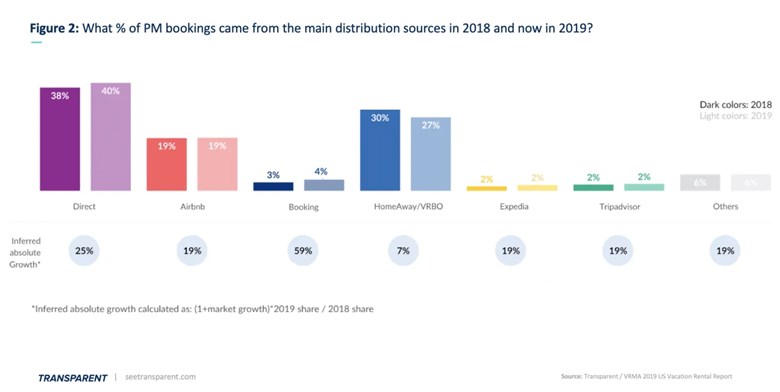[ad_1]
Like many sectors inside of the go back and forth business, the distribution panorama for non permanent holiday rentals is ruled by way of marketplaces.
According to Transparent/VRMA analysis, virtual marketplaces drove 60% of bookings for assets managers in 2019. Many of the greatest marketplaces also are channels in that they’re on-line go back and forth businesses (Expedia/VRBO, Booking.com, Airbnb).
However, the pandemic has published some susceptible issues and misalignment of incentives inside of the conventional marketplace fashion.
Even earlier than coronavirus, many of the scorching button problems round protection and the coverage of hosts’ assets had been exacerbated by way of the very forces that make marketplaces so environment friendly and robust.
But in recent years, different membership-based trade fashions have emerged in the choice lodging sector. These websites focal point extra on group development to obtain each delivery and call for, thus bringing in combination like-minded hosts and visitors.
While those club websites are technically nonetheless categorized as marketplaces, the means and worth proposition is other, as are the incentives to take part on each the delivery and call for facet.
- Is the conventional marketplace fashion sustainable with the incentive construction on either side?
- Do new membership-based distribution channels higher align incentives between hosts, visitors, and the website online itself?
Marketplace dynamics
For a marketplace to prevail, incentives will have to be aligned on every facet – delivery and call for. For non permanent holiday rentals, this implies hosts or assets managers on one facet and visitors on the different.
You may just additionally argue that there’s a 3rd facet – that of the website online itself, the place a mixture of algorithms, synthetic intelligence, and human optimization attempt to maximize revenues and liquidity.
For the website online itself, whether or not an OTA or a metasearch marketplace equivalent to the now defunct Tripping, aligning incentives way assuming customers behave in a definite method as soon as on the website online. The factor is that as a marketplace scales, this conduct can trade as one facet or the different tries to realize a bonus.
Josh Breinlinger, Managing Director of Jackson Square Ventures, a VC company focusing on marketplace investments says on his weblog: “Most marketplaces I do know finally end up seeing some sudden conduct from their customers. As quickly as you might have any type of scale, masses of other people will attempt to recreation your device.”
Here are 3 incentive misalignments to imagine for non permanent holiday condo marketplaces:
#1 Flexibility vs. money drift
Guests will at all times need most flexibility with their reserving. The pandemic has shifted this need to an expectation. However, versatile cancellation insurance policies had been at all times sexy on the demand-side. Look no additional than the airways, who carved out a separate magnificence years in the past for versatile fares.
On the different facet, hosts want a point of walk in the park to regulate money drift. Last minute cancelations generally is a logistical nightmare, and relying on the reserving channel, can cause a onerous refund procedure. Of direction, the pandemic has exacerbated this factor with Airbnb providing visitor refunds with out first consulting hosts, leading to a contemporary backlash.
It looks like flexibility will likely be the norm for no less than the foreseeable long term, whilst hosts attempt to navigate this new customary throughout all of their distribution channels.
#2 Review set of rules vs. stock freshness
Almost all marketplaces, both OTAs or metasearch, rely considerably, however now not solely, on two metrics to decide a assets’s score:
- Number of general visitor critiques
- Average megastar score of the ones critiques
All different components being equivalent, a assets that meets a visitor’s seek standards will likely be proven upper in the ratings in the event that they carry out smartly in a single or each of those spaces.
While that is treasured from a visitor point of view, it items a pair of demanding situations on the delivery facet.
Property managers who constantly upload new stock to their portfolios will have issue getting those new homes to rank in seek effects. This has a carry-on impact to the demand-side, the place visitors may now not even see homes which may be a just right are compatible for his or her seek standards.
Without a important mass of extremely rated critiques, person hosts may be confronted with mountaineering a steep hill in opposition to visibility on any given marketplace website online, to not point out, producing exact income.
#three Instant reserving vs. correct visitor vetting
A couple of years in the past, there used to be a large motion in opposition to connectivity which continues to at the present time. In order to compete towards conventional inns, assets managers and hosts had been being driven in opposition to quick bookings.
For an business that had simply embraced on-line reserving in some instances, this used to be subsequent stage and past the technological way of many in the holiday rentals trade.
Airbnb and Booking were given into an palms race for the identify of class chief in in an instant bookable merchandise. Airbnb began to praise hosts that would unencumber stock in actual time.
Innovation is at all times a favorable, particularly in the go back and forth business the place many sectors have traditionally lagged. However, one drawback of quick bookings used to be shedding the skill to correctly vet a visitor earlier than taking fee.
Philip Kennard, CEO of business connectivity tech corporate Futurestay, provides: “As STR strikes into the mainstream, there’s an incompatibility between the conventional, hands-on business and the trendy, frictionless business. There are hundreds of thousands of person homeowners and managers, and nobody has written a playbook for all of them but. That’s why more than one marketplaces will at all times be vital.”
This is extra of a misalignment between the supply-side and the marketplace itself. The marketplace desires to maximise income and liquidity and will take a reserving from any consumer (visitor). Hosts and PMs of direction need to become profitable, but additionally need to offer protection to their property and limit any renters who may well be disrespectful or irresponsible.
Airbnb, VRBO, and others mitigate this possibility for hosts with a “traveler rating,” however this isn’t a panacea.
New fashions emerge
While the conventional marketplace fashion stays the most well liked in the choice lodging sector, new codecs have introduced that take a special means.
Membership websites, the place one or either side ‘pay to play,’ are becoming more popular and traction in the North American marketplace.
For instance, TrustedHousesitters is a membership-based website online for puppy fans and homeowners. On the delivery facet sit down householders who go back and forth often and are in want of verified and depended on puppy sitters. On the call for facet are vacationers (the sitters) who’re on the lookout for an affordable method to discover new locations.
Both householders and puppy sitters pay an annual rate of $129 to get entry to the website online. However, no cash is transacted all through the ‘booking’ procedure and consumer profiles are very thorough and tough.
This arguably gives the next stage of accept as true with and transparency than conventional marketplaces. For instance, sitters, the visitor on this case, undergo more than one layers of verification, together with a reference test.
Mathew Prior, CEO of TrustedHousesitters, says: “We see our membership-based income fashion create a way of group and responsibility this is difficult to search out on different websites. Our participants on either side really feel like they’re phase of one thing larger – now not only a transaction ready to be processed. We suppose our fashion supplies far more worth than conventional marketplaces.”
Unlike the present atmosphere with conventional marketplaces, in the case of TrustedHousesitters, the cancellation coverage closely favors the host. A “sit down” can’t be canceled until each events agree there are ‘extraordinary circumstances.’ If each events don’t agree, and a sitter cancels a keep, an investigation may just happen with imaginable disciplinary motion towards the sitter.
Another membership-based group for non permanent rentals is Golightly, a non-public go back and forth membership for girls best (males can go back and forth, however best ladies would possibly sign up for.) To sign up for, you will have to be referred by way of an present member.
Aside from powering the website online’s acquisition technique, the referral flywheel will increase the incentive to take care of just right status in the community, since all participants are separated by way of not more than a point or two from every different. It additionally supplies an additional layer of vetting and protection.
The platform takes a reduce of every reserving on every facet – 10% from the traveler and five% from the host.
Traditional marketplaces don’t seem to be going to be disrupted, a minimum of in the non permanent, by way of those rather new entrants.
For hosts and assets managers, there may be massive worth in distributing their product on conventional marketplaces and OTAs. These websites proceed to supply large scale and are ready to successfully gain customers partially as a result of of nice search engine marketing constructed up over the years.
Membership-based websites can not be offering the identical visibility and arguably goal a completely other kind of visitor altogether. Afterall, puppy sitting will not be on everybody’s holiday itinerary.
But, when comparing marketplace dynamics, those choice fashions do reputedly align incentives extra optimally for each delivery and call for facets. This leaves the door open for choice fashions going ahead in the STVR sector.




